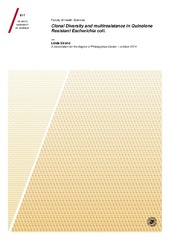| dc.contributor.advisor | Jenkins, Andrew | |
| dc.contributor.author | Strand, Linda | |
| dc.date.accessioned | 2015-06-24T08:43:34Z | |
| dc.date.available | 2015-06-24T08:43:34Z | |
| dc.date.issued | 2015-03-26 | |
| dc.description.abstract | Denne studien har undersøkt Escherichia coli resistente for kinoloner, en bredpektret gruppe antibiotika. Målet har vært å finne ut hvorfor disse bakteriene oftere er resistente mot andre antoibiotikagrupper. Studiet er basert på molekylærgenetisk analyser - herunder klonal analyse, plasmidanalyser og undersøkelse av resistensgener.
Resultatene viser at kinolonresistente Escherichia coli er ofte multiresistente. Resultatene motbeviser flere hypoteser for denne sammenhengen bl. a. spredning av kloner og plasmidbårne kinolonresistensgener. Studiet tyder på at resistens mot andre antibiotika oppstår tidlig i utvikling av kinolonresistens. Hypotesen som er mest forenelig med våre resultater er at kinoloner utløser SOS-respons (en stress respons hos bakterie) som igjen fører til økt mutasjon og mobilisering av multiresistente plasmider. | en_US |
| dc.description.abstract | This study has investigated Escherichia coli resistant to quinolones. The aim was to find out why these bacteria often are resistant to other antibiotics. The study is based on molecular genetics - including clonal analysis, plasmid-analysis and investigation of antibiotic resistance. The results show that quinolone resistant Escherichia coli often are multiresistant. The results contradict several hypotheses for this relationship among others the proliferation of clones and plasmid mediated quinolonresistance coupled to multiple resistance genes. The study suggests that resistance to other antibiotics occurs early in the development of quinolone resistance. The hypothesis that is most consistent with our results is that quinolones trigger the SOS response (a stress response in bacteria) which in turn leads to increased mutation and mobilization of multiresistant plasmids. | en_US |
| dc.description.doctoraltype | ph.d. | en_US |
| dc.description.popularabstract | Denne studien har undersøkt Escherichia coli resistente for kinoloner, en bredpektret gruppe antibiotika. Målet har vært å finne ut hvorfor disse bakteriene oftere er resistente mot andre antoibiotikagrupper. Studiet er basert på molekylærgenetisk analyser - herunder klonal analyse, plasmidanalyser og undersøkelse av resistensgener.
Resultatene viser at kinolonresistente Escherichia coli er ofte multiresistente. Resultatene motbeviser flere hypoteser for denne sammenhengen bl. a. spredning av kloner og plasmidbårne kinolonresistensgener. Studiet tyder på at resistens mot andre antibiotika oppstår tidlig i utvikling av kinolonresistens. Hypotesen som er mest forenelig med våre resultater er at kinoloner utløser SOS-respons (en stress respons hos bakterie) som igjen fører til økt mutasjon og mobilisering av multiresistente plasmider. | en_US |
| dc.description.sponsorship | This work has been a part of Telelab’s internally funded research program in addition to grants from the Scandinavian Society for Antimicrobial Chemotherapy and Norsk Overvåkingssystem for antibiotikaresistente mikrober (NORM). | en_US |
| dc.description | Paper 1, 2, 3, and 5 are not available in Munin:
<br> 1: Grude N, Potaturkina-Nesterova NI, Jenkins A, Strand L, Nowrouzian FL, Nyhus
J, Kristiansen BE: 'A comparison of phylogenetic group, virulence factors and antibiotic
resistance in Russian and Norwegian isolates of Escherichia coli from urinary tract
infection', available in <a href="http://dx.doi.org/10.1111/j.1469-0691.2006.01584.x">Clinical microbiology and infection : the official publication of the European
Society of Clinical Microbiology and Infectious Diseases 2007, 13(2):208-211</a>
<br>2: Grude N, Strand L, Mykland H, Nowrouzian FL, Nyhus J, Jenkins A, Kristiansen
BE: 'Fluoroquinolone-resistant uropathogenic Escherichia coli in Norway: evidence of
clonal spread', available in <a href="http://dx.doi.org/10.1111/j.1469-0691.2008.01952.x">Clinical microbiology and infection : the official publication of the European
Society of Clinical Microbiology and Infectious Diseases 2008, 14(5):498-500</a>
<br>3: Strand L, Jenkins A, Grude N, Allum AG, Mykland HC, Nowrouzian FL,
Kristiansen BE: 'Emergence of fluoroquinolone-resistant clonal group A: clonal analysis
of Norwegian and Russian E. coli isolates', available in <a href="http://dx.doi.org/10.1111/j.1600-0463.2010.02623.x">APMIS : acta pathologica, microbiologica, et
immunologica Scandinavica 2010, 118(8):571-577</a>
<br>5: Linda Strand, Andrew Jenkins, Nina Narmoe, Beate Kiland Langerud , Anne Gry
Allum, Nils Grude, Bjørn Erik Kristiansen: 'Resistance Mechanisms in multiresistant
fluoroquinolone resistant Escherichia coli at an early stage of the emergence of
ciprofloxacin resistance in Norway', not yet published | en_US |
| dc.identifier.uri | https://hdl.handle.net/10037/7791 | |
| dc.identifier.urn | URN:NBN:no-uit_munin_7379 | |
| dc.language.iso | eng | en_US |
| dc.publisher | UiT The Arctic University of Norway | en_US |
| dc.publisher | UiT Norges arktiske universitet | en_US |
| dc.rights.accessRights | openAccess | |
| dc.rights.holder | Copyright 2015 The Author(s) | |
| dc.rights.uri | https://creativecommons.org/licenses/by-nc-sa/3.0 | en_US |
| dc.rights | Attribution-NonCommercial-ShareAlike 3.0 Unported (CC BY-NC-SA 3.0) | en_US |
| dc.subject | VDP::Medisinske Fag: 700::Basale medisinske, odontologiske og veterinærmedisinske fag: 710::Medisinsk molekylærbiologi: 711 | en_US |
| dc.subject | VDP::Medisinske Fag: 700::Basale medisinske, odontologiske og veterinærmedisinske fag: 710::Medisinsk mikrobiologi: 715 | en_US |
| dc.subject | VDP::Medical disciplines: 700::Basic medical, dental and veterinary science disciplines: 710::Medical molecular biology: 711 | en_US |
| dc.subject | VDP::Medical disciplines: 700::Basic medical, dental and veterinary science disciplines: 710::Medical microbiology: 715 | en_US |
| dc.title | Clonal Diversity and multiresistance in Quinolone Resistant Escherichia coli. | en_US |
| dc.type | Doctoral thesis | en_US |
| dc.type | Doktorgradsavhandling | en_US |


 English
English norsk
norsk




